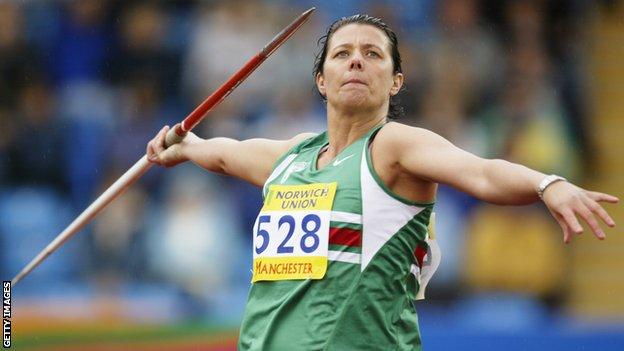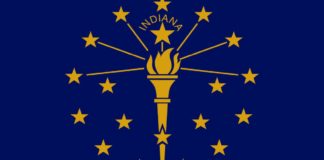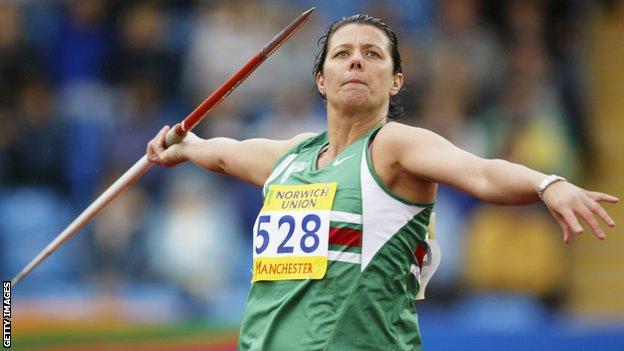
It takes a lot to make Shelley Holroyd think twice about competing.
The javelin thrower once stopped a doctor from putting a plaster cast on her injured arm because it would have interfered with her Olympics training.
But if she were still competing, Holroyd is not sure she would feel comfortable taking part in the 2023 World Athletics Championships.
The event is being held in Hungary, whose government has introduced a number of laws hostile to LGBTQ+ people – and Holroyd is gay.
“Personally, I’d be a little apprehensive about going,” she says.
“If you’re an LGBTQ+ athlete and you’re going to a place that’s quite homophobic, you’re going to have that resting on your shoulders.
“You know, are they going to be booing you in the stadium? If you get disrespected when you’re on the track or field, it’s not a good place to be, and it does affect people.”
Holroyd will not have to make that decision, as she retired in 2006 – but an increasing number of active LGBTQ+ sportspeople are facing an unenviable choice.
Do they compete in countries with laws or governments that discriminate against LGBTQ+ people, or stay at home and miss competitions they’ve spent a lifetime training for?
Governing bodies, too, are under mounting pressure to explain how awarding events to such countries fits with their own commitments to inclusion and diversity.
Are actions matching words?
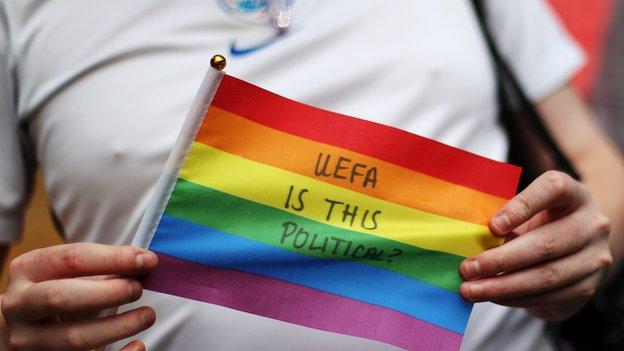
The sporting calendar for the next few years shows just how many major events are being held in countries with laws hostile to the LGBTQ+ community.
Oman – where homosexuality is illegal – has hosting rights for the 2024 Hockey5s World Cup – a five-a-side version of the sport – and will co-host the Men’s T20 Cricket World Cup this October and November.
Being gay is also criminalised in Qatar, where world governing body Fifa will stage football’s 2022 World Cup – four years after it was played in Russia, a country condemned by the European Court of Human Rights for promoting homophobia.
Uefa, European football’s governing body, has chosen the Russian city of St Petersburg to host the 2022 Champions League final, a season after giving the 2021 Europa League final to Gdansk in Poland, where same-sex relationships are not legally recognised and same-sex couples are banned from adopting children together.
“Personally, I find this kind of thing really disappointing to see,” says Sam Schofield, founder of the Proud Surrey inclusive cricket supporters group.
“You’d like to think governing bodies would look into this a bit more and say: ‘You know what? If these countries apply to host, we’ll turn them down and make a point of saying it’s not a good place for certain people to live in your country, and we’re not OK with that.’
“It’s just so frustrating when you see and hear one thing about inclusion, and then governing bodies are doing completely the opposite.”
What do the governing bodies say?
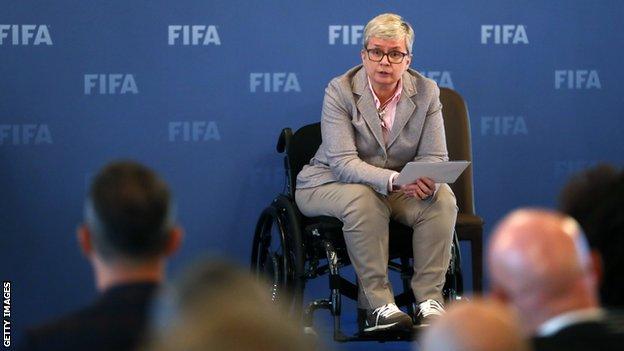
Joyce Cook, Fifa’s chief social responsibility and education officer – and herself gay – believes the staging of major tournaments can push change.
“I’ve always believed, even before I joined Fifa, that [staging the World Cup somewhere such as Qatar] is an opportunity,” she says.
“You don’t change anything unless you go to new places.
“Our primary responsibility as the governing body of football is to grow the body around the world. However, we are very clear that, for our hosts, our tournaments have to be all-inclusive.”
Uefa, for its part, launched its ‘Sign Up for an Equal Game’ initiative during the build to Euro 2020.
And the FIH – field hockey’s world governing body – has assured fans that no-one going to the Hockey5s World Cup will be excluded because of their ethnicity, gender, sexuality or religion.
BBC Sport has approached World Athletics and the International Cricket Council for comment.
‘We need to walk the walk’
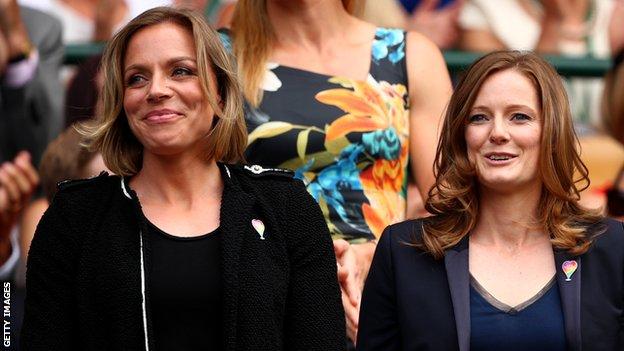
When news of Oman hosting the 2024 Hockey5s World Cup broke, British Olympic gold medallist Kate Richardson-Walsh was concerned.
“Awarding tournaments to countries where being LGBTQ+ is illegal is incomprehensible,” she tweeted.
“We need to walk the walk and talk the talk.”
Others have gone a step further by ruling themselves out of events that are staged in countries that are hostile to the LGBTQ+ community.
That’s what Jack Bristow – a former age-group European triathlon champion – did last month, when he found out that the age-group World Championships were being held in the United Arab Emirates.
“I will be withdrawing my entry,” Bristow posted on social media.
“It is important for me to compete as an openly gay athlete. I take pride in that and, for me, that’s more important than any one race.”
‘I needed to take a stand without disrespecting that country’
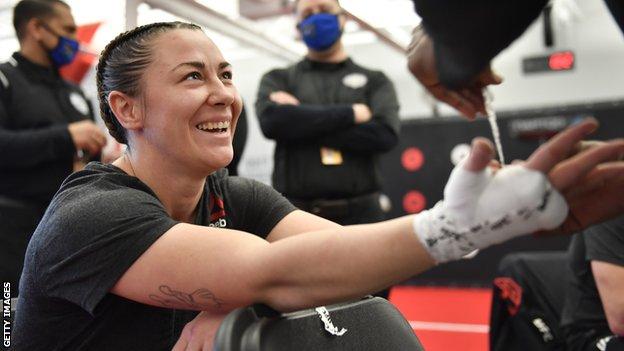
There are different views about this issue within the LGBTQ+ community, though.
During the pandemic, English mixed martial arts fighter Molly McCann took part in UFC bouts in the United Arab Emirates, where all sexual activity outside of heterosexual marriage is illegal.
She felt it was important to take a stand for her identity – citing the Black Lives Matter protests as an inspiration.
“I’d always said I’d try to avoid fighting in places that have a negative view on LGBTQ+ people, because it’s not like we get to choose to be this way,” McCann says.
“But it was when the Black Lives Matter protests were happening, and I just thought: ‘Who am I to step away, just because I’m gay and I might feel uncomfortable in that situation?’
“I still took my rainbow gloves and Pride Month clothing. I just thought I needed to take a little bit of stand without disrespecting that country, and did it the best I could.”
Di Cunningham, the Norwich City football supporter who co-founded Three Lions Pride, echoes the views of Fifa’s Cook and UFC’s McCann that sport can foster changes of attitude.
Three Lions Pride, the inclusive supporters group for England fans, came to prominence at the 2018 World Cup in Russia by displaying its rainbow-themed flag during matches.
“Football has the power to transform, and there’s only so much you can do when you’re talking in a vacuum,” Cunningham says.
“So being able, through football, to take LGBTQ+ inclusion to places where it’s a novelty is a huge bonus.
“We had a guy come through the crowd in Russia to ask if our flag was a rainbow, and that was an epiphany for him. He’d never seen one inside a stadium because of his own sexual orientation, so that was transformative.
“And if we can get our banner in places that will be caught by TV cameras, we’ve spread that message of inclusion right around the world.”
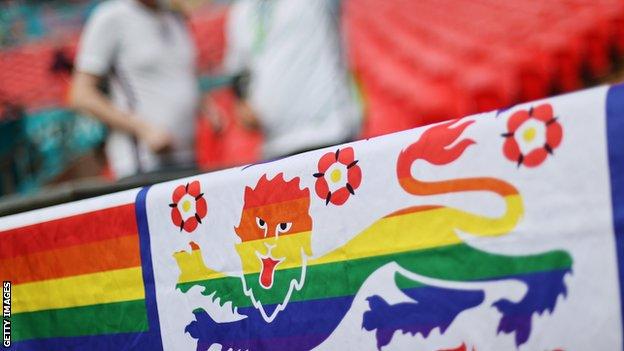
Tackling discrimination or lip service?
Many of sport’s governing bodies have campaigns that tackle discrimination in its broadest terms.
But some groups in sport have reservations about whether those words carry much weight when it comes to the LGBTQ+ community.
“I think there’s a lot of lip service paid to the concerns of LGBTQ+ athletes,” says Sarah Townsend, the co-president of the European Gay and Lesbian Sport Federation.
“A lot of organisations have charters or a Bill of Rights they say they’ll live up to. But when it comes down to the bottom line, they don’t do what they say they’re going to.
“And even if events are given to certain countries that don’t protect LGBTQ+ rights, the organisations should.”
‘If you go to new places, you open up and shine a spotlight’
And that, for many LGBTQ+ people, is still the key question – should major events even be going to these countries at all?
“I hear what you’re saying,” says Fifa’s Cook when asked about the 2022 World Cup in Qatar.
“But if you go to places, you open up and shine a spotlight.
“In regards to LGBTQ+ rights, we have a time to go yet as it’s not until the end of next year that we host the tournament – and I believe that we will leave a legacy.
“Whether that legacy is the debate [over LGBTQ+ rights] that has already started, I hope that legacy will be still greater.
“I really hope this leads to much more lasting change, and we will do our bit. But in the end, our responsibility is to deliver the World Cup, open up the dialogue, lift up those voices, and do everything to open up a long-term legacy.”
Hear new episodes of the BBC’s LGBT Sport Podcast every Wednesday on BBC Sounds.

